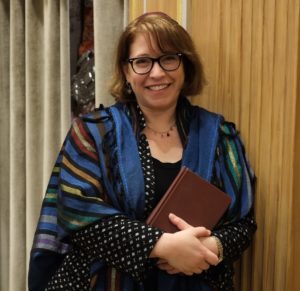Commentary on Parshat Bechukotai (Leviticus 26:3 – 27:34)
On May 7, about 9,000 Israelis and dozens of Palestinians marked Yom HaZikaron, Memorial Day, with a joint service in Tel Aviv. They gathered in spite of public criticism by Prime Minister Benjamin Netanyahu; in spite of the fact that his government had turned down all 181 travel permit applications of Palestinians from the West Bank invited by the organizers (the Supreme Court later overturned this decision, enabling them to enter); and in spite of the protesters who gathered with signs that read “Death to Arabs.” They gathered to share stories of those who died due to violence on both sides, and to assert commitment towards peace and reconciliation. In the words of the organizers, “The Israeli-Palestinian Memorial Day reminds everyone that war is not a predetermined fate, but only a human choice.”
The annual ceremony is an assertion of hope in the midst of what seems to be a never-ending struggle and in a time in which cynicism, distrust, and despair are far more common responses to the Israeli-Palestinian conflict.
Sign up to receive Torah from T’ruah in your inbox each week.
In this week’s Torah portion, Bechukotai, the Torah briefly describes the rewards that will come if the Israelites adhere to God’s instructions and then, at length and with painful detail, describes the consequences that will occur if/when they do not. In its verses, Bechukotai asserts a particular vision of Divine punishment. Among the many fates it lists, the one that strikes me most deeply is purposelessness and frustration: “You shall sow your seed to no purpose, for your enemies shall eat it” (Leviticus 26:16) and “though you eat [your bread], you shall not be satisfied.”
Our rabbinic ancestors paired Bechukotai with Jeremiah 16 and 17 for the Haftarah [prophetic reading]. These sections of Jeremiah affirm the negative consequences that the Torah raises while also positing a different vision of Divine punishment. Jeremiah speaks about this punishment not only as physical defeat, but rather as a psychological state of being. Jeremiah states, “He [who is cursed] shall be like a bush in the desert, which does not sense the coming of good.” (Jeremiah 17:6) In contrast, a blessed person is “like a tree planted by the waters, sending forth its roots by a stream: it does not sense the coming of heat, its leaves are ever fresh; it has no care in the year of drought, it does not cease to yield fruit.” (Jeremiah 17:8)
According to Jeremiah, the ultimate punishment from God is hopelessness. Divine punishment is a world in which we cannot see a future that is better than the reality in which we live, when we cannot sense the coming of relief and possibility. Hopelessness leaves us “in a barren land without inhabitant” (Jeremiah 17:6). This is the most harmful thing we could wish for ourselves and for others, according to the prophet Jeremiah.
When working on U.S. issues, I find myself rarely giving up hope even under difficult circumstances. Yet, when I consider Israel, I find it much harder to cultivate a sense of hopefulness. The seeming intractability of the occupation, increasing signs of nationalism, an erosion of the values articulated in the founding Declaration of Independence for the State of Israel — all can lead me towards cynicism and despair. Yet, as Jeremiah articulates, hopelessness is a curse that leads us adrift and alone, a self-fulfilling prophecy that “yields no fruit.”
When it comes to the occupation, it is vital to maintain hope in order to maintain engagement. When things feel especially hard, I think about that Memorial Day organized by the Parents’ Circle and Combatants for Peace. I think about the brave Jewish and Arab women of Women Wage Peace mobilizing tens of thousands of people to demand a mutually binding non-violent accord between Israelis and Palestinians. I think of those who come together to promote a Jerusalem for all through the nonprofit Ir Amim. If those on the ground can find ways to work together, even in the midst of so much hostility, and articulate their hopes for a shared future, can we raise up their voices?
Find more commentaries on Parshat Bechukotai
When we choose despair, we walk away from those who are fighting each day for peace, at great risk for themselves and other. When we guard ourselves against the hopelessness articulated by Jeremiah, we find ways to be a voice and an agent for change. 
The Haftarah for Bechukotai ends, “O Hope of Israel! Heal me, Adonai, and let me be healed; save me and let me be saved.” Jeremiah reminds us that our faith is the source of our hope. And this hope is and can be a source of healing and salvation for ourselves and for the world.
Rabbi Lauren Grabelle Herrmann is the rabbi of SAJ-Judaism that Stands for All in New York City. She is the co-chair of the Rabbinic Council of Jews for Racial and Economic Justice.


